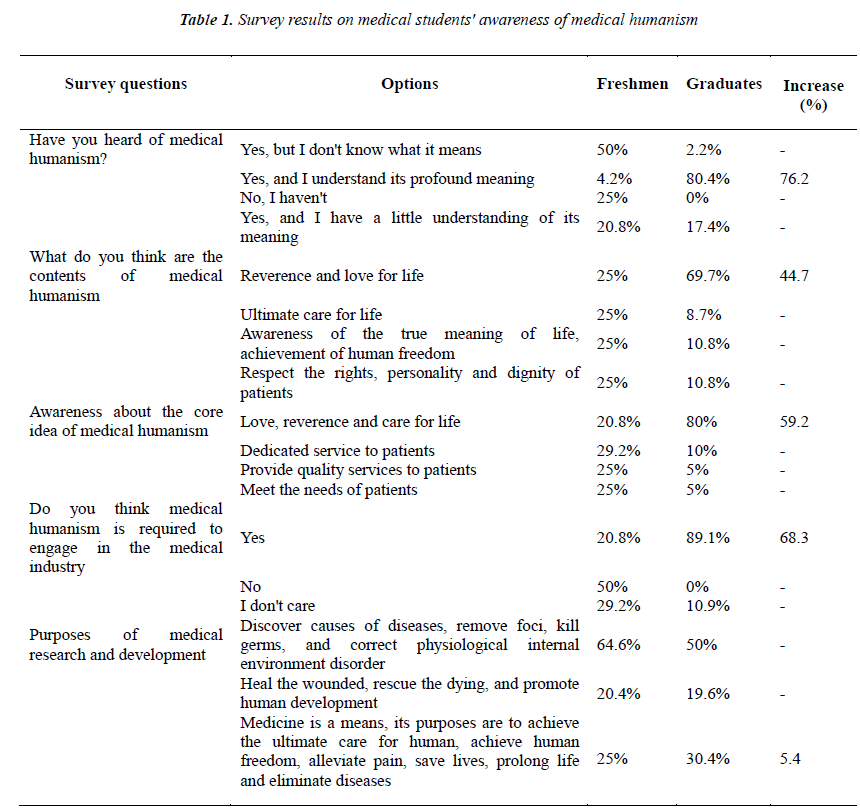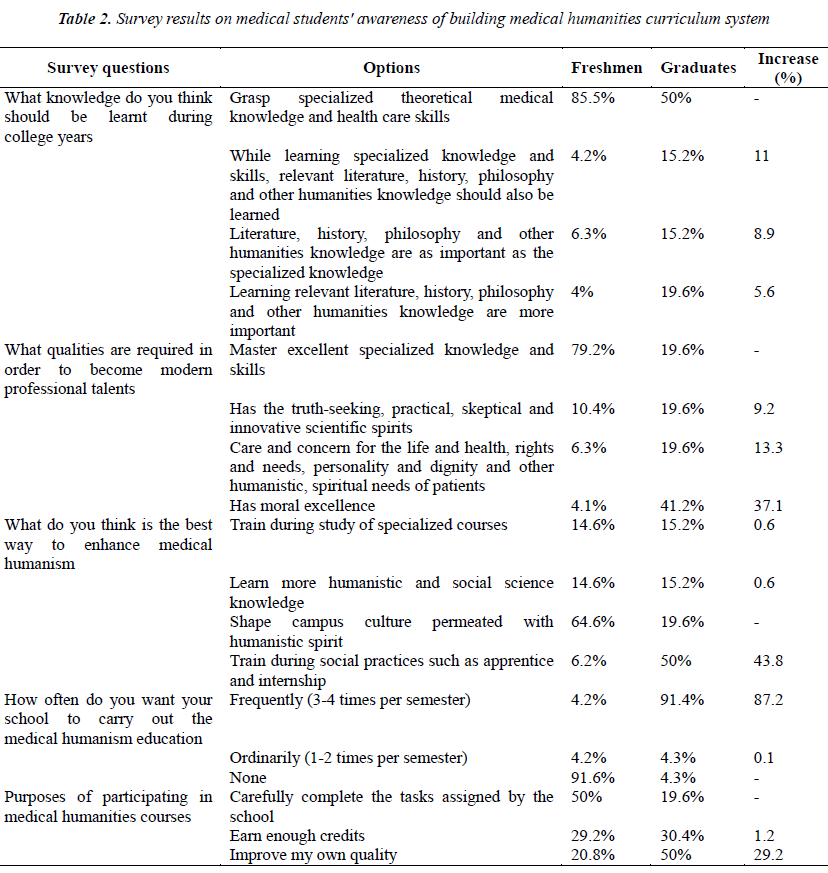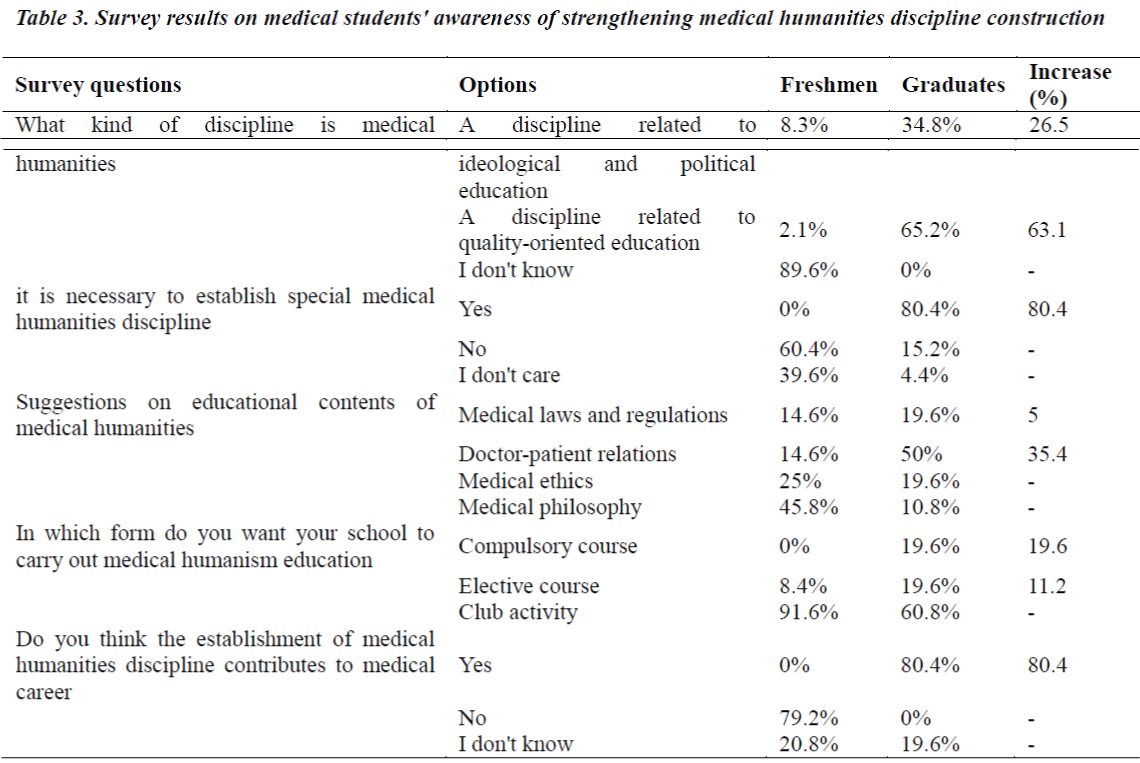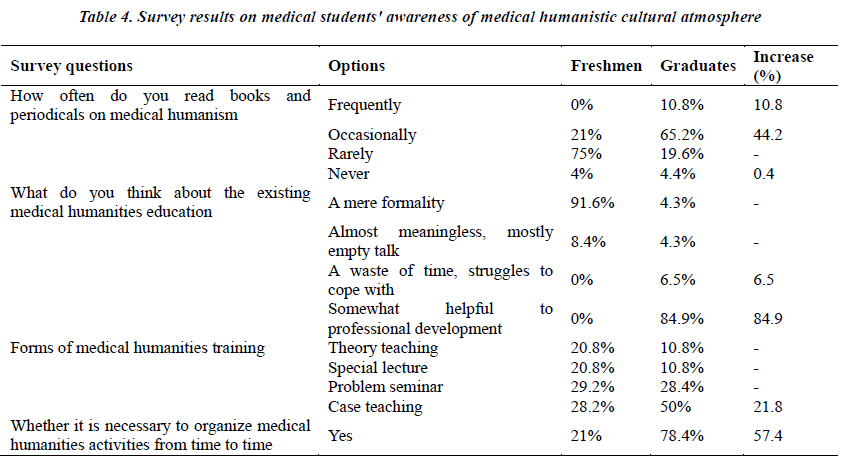- Biomedical Research (2015) Volume 26, Issue 4
Training of medical students in humanism
Fuqing Gong1,2*, Yunpeng Diao1, Hongliang Sun1 and Yang Yao1
1Dalian Medical University, Dalian 116044, China
2Liaoning Normal University, Dalian 116029, China
- Corresponding Author:
- Fuqing Gong
Dalian Medical University
Dalian 116044, 116044 China
E-mail: dlgongfq@126.com
Accepted date: March 17 2015
Abstract
Today's society is very competitive, so medical students face huge employment pressure and life stress. Medical students' personal integrity or universities' teaching management are also problematic, which are reflected in medical students' lack of life respecting humanistic spirit. This suggests that the concept of medical education by which professional talents are trained does not adapt to the development requirements of modern medicine. This study finds lack of medical humanistic spirit among medical university students by way of visits, questionnaires and interviews to them; then proposes effective methods for training medical students' medical humanism through summarization and analysis of data. When just enrolled in the universities, medical students do not know the meaning of medical humanism, cannot properly understand the importance of medical humanism to medical professionals, and are unable to give proper suggestions on how to build medical humanism. But after five years of study, graduate interns can discover the importance of medical humanism to the development of medical industry upon specialized learning and clinical practice, and are capable of proposing effective countermeasures for building medical humanism based on their own experience. Effective countermeasures for training medical humanism are proposed as follows: specific countermeasures for training medical students' medical humanism such as establishing aims of training medical humanism, strengthening the construction of medical humanities discipline, creating the cultural atmosphere of medical humanism, and improving the management mechanism of medical humanities education.
Keywords
Medical Students; Medical Humanism; Medical Humanism Training
Background
From the beginning of 1952, China has borrowed the education system from former Soviet Union to change its original comprehensive universities to specialized universities, valuing natural sciences while neglecting the development of liberal arts. Henceforth, China has gradually formed an education system centered on specialized education. For a long time, teaching in China's medical universities has been dominated by biomedical knowledge and skills, where humanities courses are not taken seriously. Such undervaluation is not merely students' interest, but rather top-down neglect by universities, teachers to students. Students learn knowledge of medical humanities just to deal with examinations, who do not have a comprehensive knowledge and understanding of medical humanism, rights and obligations of both doctors and patients, and so on. Particularly during internship, they exhibit poor ability to communicate with patients, lack of concern and compassion for patients, and inability to care for the psychological needs of patients. Therefore, most medical students only have medical skills while lacking medical ethics, humanistic spirit, and respect and care for life [1-2].
Medical students are affected by this concept when just entering universities, which also leaves potential problems for their future medical career. According to media reports, a medical student photographed a human skeleton used for teaching as a prop in his hand during the anatomy practical class, and uploaded it to the Internet, causing a lot of controversy on the Internet. The event not only reflects current problems in medical students' personal integrity and schools' teaching management, but more importantly, reflects medical students' lack of life respecting and revering medical humanistic spirit. Meanwhile, it reflects China's medical educational concept of training professional talents fails to truly embody the essence of medicine, which is not adapted to the development requirements of modern medicine.
Today's society is highly competitive, so medical students face huge employment pressure and life stress. Therefore, how to achieve personal value becomes medical students' direction of efforts. When social value conflicts with personal value, personal value tends to be the priority for medical students, especially in the choice of occupation, the foremost consideration is the level of income. Some medical students choose to study medicine not because they love medical career, and strive to become qualified medical professionals; utilitarian tendency is obvious in their learning motivation and purpose. Therefore, through survey of medical university students, this study finds lack of medical humanism among medical students; then proposes effective methods for improving their medical humanism through summarization and analysis of data [3-6].
Methods
Study design
This study is a qualitative descriptive research, in which two groups are surveyed by questionnaire. The purpose of this study is to explore how to train medical students' medical humanism. [7-8].
Background and participants
Forty-eight respondents (all 5-year medical program students) were participated in the questionnaire survey that was conducted in two separate times. The first time was when freshmen just entered the university, and the second time was when they graduated five years later. Freshmen did not know what was exactly medical humanism or what was it specifically for. But with their abilities to perceive new things, they had their own understanding of medical humanism, and the thirst for knowledge, which were often the best way to improve their medical humanistic spirit. Medical students who were interning and ready to graduate, on the other hand, were slowly transitioning from students to doctors. Because they were closer to the patients, they better understood how the knowledge and skills they learned would be applied clinically. Meanwhile, they were also gradually clear about the importance of medical humanism, and better knew how to enhance medical humanism; their suggestions would be conducive to the cultivation of future medical students' medical humanism. Through training of medical humanism in 5-year degree universities, achievements and shortcomings concerning existing methods of medical humanism cultivation in universities can be found. So questionnaire survey was conducted at different times, namely enrollment and graduation, choosing the same students.
Data collection
Survey instrument
A self-developed "Questionnaire on Current Situation of Medical Humanism among Students in Medical Universities" involving medical students' understanding of the importance of medical humanism, understanding of relevant medical humanities knowledge, reading of books and periodicals on humanities, conduct of medical humanities education activities, and demand for medical humanism training, participation and suggestions. Topics primarily came from open interviews with students from medical universities; topics in relevant existing questionnaire studies were also consulted. The questionnaire consisted completely of choice questions [10].
Survey procedure
This questionnaire survey was conducted in two forms: a part of questionnaires were issued at medical humanities classes in medical universities, filled out in situ, where unclear questions were consulted promptly, in order to ensure the validity of the questionnaire; another part of questionnaires were distributed further to student dormitories, filled out under supervision, and collected timely.
Ethical consideration
This study has been approved by the Ethics Committee of Dalian Medical University. The names and related information of participants in this study were kept confidential. Participants voluntarily participated in the survey, the acquisition of all questionnaires was consented by participants; participants had the right to withdraw from the survey at any time.
Data analysis
Statistical analysis was performed using SPSS 13.0 statistical software. Conclusions were drawn through relevant descriptions and answers in the questionnaire using theoretical knowledge and comparative literature analysis [9-11]. Significant implications were found after discussion through reading and analysis of the questionnaire answers.
Results
Sample status
Forty-eight questionnaires were distributed during enrollment, and 48 valid questionnaires were returned, the valid return rate was 100%. Forty-eight questionnaires were distributed during graduation, and 46 valid questionnaires were returned (2 questionnaires were unreturned due to dropout and repetition reasons), the valid return rate was 95.8%. All respondents were clinical medicine major students. Gender was random [12].
Medical students' awareness of medical humanism
Survey revealed that to the question "Have you heard of medical humanism?", 50% of freshmen chose "Yes, but I don't know what it means". Most medical students did not know what was medical humanism; they lacked of rational and emotional awareness of medical humanism, and more importantly, had no adequate ways and means to understand and learn the medical humanism. More than 80% graduate interns had been able to profoundly understand medical humanism and its necessity, which was 76.2% higher than the freshmen. See Table 1.
Survey on medical humanities curriculum system showed that the majority of freshmen contacted rather little with relevant courses, who had no awareness of curriculum system construction. Graduate interns had profound theoretical knowledge base on medical humanities courses through systematic course learning. Survey showed that 91.4% of graduates were clear about the purposes of medical humanities courses, willing to accept schools' relevant courses, and hoped for more offering of such courses. Graduates were more willing to accept the medical humanities courses, which was 87.2% higher than the freshmen. See Table 2.
Medical students' awareness of strengthening medical humanities discipline construction
Survey revealed that 89.6% of freshmen did not know the importance of medical humanities discipline and how to build the medical humanities discipline. Eighty point four percent of graduate interns felt the need to construct the medical humanities discipline. Some of them wanted to study the medical humanities specialty while majoring in clinical medicine to get double degree upon graduation. See Table 3.
Medical students' awareness of medical humanistic cultural atmosphere
Survey revealed that freshmen hoped their schools to create a good medical humanistic cultural atmosphere, but they had no specific, clear objectives. Graduates hoped their schools to create medical humanistic cultural atmosphere, and were able to provide comments and suggestions, which were mainly organization of occasional lectures, participation in the memorial events of "speechless anatomical teachers", construction of memorial monuments for experimental animals and other activities. No freshmen were willing to donate blood stem cells, whereas 11% of graduates were willing to donate, indicating that after five years of medical humanities training, students have had a profound understanding of medical humanism, and were able to practice medical humanism in real life. See Table 4.
Discussion
The survey on "Medical students' awareness of medical humanism" finds that after five years of study, graduates' level of awareness of medical humanism is significantly higher than freshmen. This indicates that students begin to slowly get to know medical humanism in the learning process of medical knowledge and skills. But the effect is not particularly desirable, because no clear goals have been set regarding cultivation of medical humanism in the training process of medical students.
China's current medical student training objectives: conform to the overall training objectives and requirements of higher education in China, and in line with the international medical education aims. Many medical colleges target to train their students as research talents. We believe that under current health policy and environment, school education can only train students' preliminary clinical abilities, while becoming qualified clinicians need to be done by postgraduate education. This also reflects the necessity of integrating school education with postgraduate continuing education, which is also the reason for medical professionals to become lifelong learners.
Therefore, China's overall medical student training objectives should be set as: medical talents with certain practical ability who combine medical humanistic and scientific spirits. Of course, there should be differences among different schools, levels and specialties. Currently, there are over 280 medical colleges and universities in China, medical schools at various levels must have different training objectives. For example, for purely research-oriented universities, student training objectives should be fostering excellent doctors and top-notch international medical talents; for teaching- and research-oriented universities, long-term program student training objectives should be fostering excellent doctors, while ordinary short-term program student training should be targeted at training high-level general practitioners; for purely teaching-oriented universities, student training should be targeted at training practical general practitioners. However, as far as the overall goal of medical student training is concerned, great importance must be attached to training medical humanistic spirit of medical students at any level and specialty, striving to foster medical talents with certain practical ability who combine humanistic and scientific spirits.
It can be seen through the questionnaire survey that through five years of study, medical students accept the medical humanities course education. Medical students also have their own ideas about building medical humanities curriculum system, which is mainly reflected during the study period in the yearn for learning relevant literature, history, philosophy and other humanistic knowledge outside of specialized knowledge and skills, and clinically in the care and concern for life and health, rights and needs, personality and dignity and other humanistic, spiritual needs of patients. Combining the experiences of domestic and foreign universities and opinions of relevant experts and scholars, our school lists seven courses, namely medical ethics, medical philosophy, history of medicine, doctor-patient communication, medical law, medical psychology and medical sociology, as core courses, which are supplemented by other courses, thus penetrating the medical humanities education throughout the entire education of medical students to maximize teaching effectiveness.
In the questionnaire, 20% of freshmen feel no need for establishing medical humanities discipline, mainly because they think medical knowledge and skills are more important, while learning medical humanism is undoubtedly an increase of burdens. In contrast, 80% of graduates think establishment of medical humanities discipline is necessary. Through five years of learning and practice, medical students realize that medical knowledge and skills are the basis for medical practitioners, whereas medical humanism is the core of medical profession. In today's world where medical humanism is receiving more and more attention from the society and medical educators, the establishment of first-level medical humanities discipline not only clarifies the concept of the discipline and identifies the research domain, but also plays a demonstrative, leading role for more medical education and research institutions, thus can effectively promote faster development of the discipline. Disciplinary normalization can solve major theoretical and practical problems of medical humanities, regularize behaviors in medical and life science researches, promote rapid development of new medical technology revolution, and enhance healthy human culture and civilization level.
Through continuous study and constant contact with the outside world, medical students' attitude towards medical humanism changes from not knowing to knowing, and then to taking the initiative to practice. We find in the questionnaire survey that medical students are more willing to engage in some medical humanistic activities (mainly including the "memorial activities for speechless anatomical teachers", "condolences to the families of donors", "memorial activities for experimental animals" and "donation of blood stem cells"), and complete the cultivation of medical humanism in such an atmosphere. Medical humanism should be reflected in the behavioral cultural construction of universities. The "speechless anatomical teacher" educational activity launched by our school educate medical students' medical humanism through a series of activities like the "acceptance and farewell ceremonies" for "speechless anatomical teachers", "memorial ceremony and Qingming rituals", "looking for role models" and "medical ethics practice", allowing medical students to comprehend the significance and true meaning of life. The school also combines medical humanism training with social practices to launch volunteer service, blood stem cell donation and Red Cross volunteer activities, practicing and promoting medical humanism while contributing to the society and medicine. Only by doing so, can the medical humanism become a behavioral consciousness in the humanistic education of medical students, can the medical humanism be rooted in the medical students' outlook on life and values, and can the students accumulate correct concepts on life, health, death and disease in their heart, truly understand the meaning of medical science, and care for life and understand patients from their heart.
Not only should ways to train medical students' medical humanism be considered from the above four points, education management mechanism should also be further improved. Improvement of medical humanities education management mechanism needs to be based on reality to establish and perfect the leading mechanism of medical humanities education. Universities should set up a leading group of medical humanities education which is fully responsible for the medical humanities educational work of respective schools. While ensuring the development direction of medical humanities education, universities should also set up a governing body of medical humanities education to organize and coordinate the daily management of medical humanities education, truly incorporating medical humanities education into the schools' overall teaching management, so as to ensure the actual implementation of medical humanities education. Meanwhile, the medical humanities education leading group should actively implement medical humanities teaching reforms, and readily provide resources within the schools and look for external resources to offer a variety of supports for the implementation of medical humanities education [13-15].
Conclusions
According to the results, we make a conclusion that training of medical students in humanism should focus on setting of education goals, establishment of curriculum system, construction of medical humanities discipline, creation of cultural atmosphere and improvement of education management mechanism.
Limitations
Objects of this study are students of Dalian Medical University, and some medical humanism training strength is also our university's experience. This study can be conducted more in-depth on a national scale and on various medical related subjects. It can also be compared with foreign medical school students in respect of medical humanism to discover our own shortcomings, and find better countermeasures for training medical humanism.
Acknowledgements
This work is supported in part by a grant from the education and scientific planning subject of China (FFB108023) and the education and scientific research subject of Liaoning province (JGZXY11017). We would like to acknowledge the cooperation of all medical students who participated in the survey.
Ethical approval
Ethics Committee of Dalian Medical University
Competing interests
All authors declare no conflict of interest.
Authors’ contributions
Guarantor of integrity of the entire study, study design and manuscript review: Fuqing Gong; Manuscript preparation and editing: Yunpeng Diao; Data acquisition, analysis and statistical analysis: Yang Yao.
References
- Giordano J: Quo vadis Philosophy, Ethics, andHumanities in Medicine - preserving the humanistic character of medicine in a biotechnological future. Philosophy, Ethics and Humanities in Medicine 2009, 4: 12-15.
- Chinen AB: Modes of understanding and mindfulness in clinical medicine. Theoretical Medicine 1988, 9(1):
- 45-71.
- Chen RC: The Spirit of Humanism in Terminal Care: Taiwan Experience. The Open Area Studies Journal2009, 2: 7-11(5).
- Gibson WC: Humanism in Medicine. Journal of the American Medical Association 1974, 229(3): 340-345.
- Epstein M: For a truly humanistic ethic, we need truly humanistic medicine. BMJ 2014, 348: g1133.
- Linda P: A Study of the Relational Aspects of the Culture of Academic Medicine. Academic Medicine2009, 84(1): 106-114.
- MILLAN LR, AZEVEDO RS, ROSSI E, Marco OL, Millan MP, Arruda PC: What is behind a student's choice for becoming a doctor? Clinics 2005, 60(2): 143-150.
- Hyppola H, Kumpusalo E, Neittaanmaki L, Mattila K, Virjo I, Kujala S, Luhtala R, Halila H, Isokoski M: Becoming a doctor - Was it the wrong career choice? Social Science and Medicine 1998, 47(9): 1383-1387.
- Hsieh H, Shannon SE: Three approaches to qualitative content analysis. Qual Health Res 2005, 15: 1277-1288.
- Ye WN, Liu JR, Zhou ZM, Zhou ZH, Liang T: Survey and analysis on ways of training medical humanism for medical students in Guangdong. Medicine &Philosophy 2014, 35(7A): 79-81.
- Ma F, Li JP, Liang HM, Bai YJ, Song JH: Baccalaureate nursing Students’ perspectives on learning about caring in China: a qualitative descriptive study. BMC Medical Education 2014, 14(42): 1472-6920.
- He L. Survey on medical students' awareness of medical humanism. Soft Science of Health 2012, 26(1):
- 30-34.
- Gong FQ: Study on training of medical students' medical humanism. Doctoral Dissertation.DalianUniversity of Technology 2012.
- Mares J: Positive psychology: reason to reflection and challenge. CeskoslovenskaPsychologie2001, 45:
- 97-117.
- Gong FQ, Dai YJ: Thoughts on general training target locating for Chinese medical students. Medicine & Philosophy 2012, 33(5A): 57-59.



